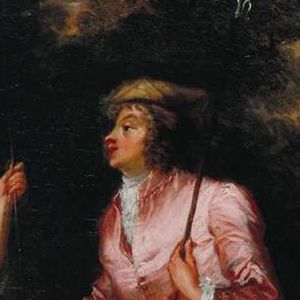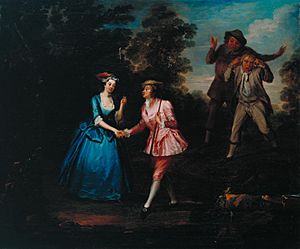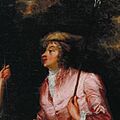Charlotte Charke facts for kids
Quick facts for kids
Charlotte Charke
|
|
|---|---|

Detail from "Damon and Phillida Reconciled: A Scene from Colley Cibber’s ‘Damon and Phillida’" in which Charke portrayed the character Damon. Painted by William Jones in 1740.
|
|
| Born | 13 January 1713 |
| Died | April 6, 1760 (aged 47) |
| Nationality | Great Britain |
| Occupation | Actor |
| Parent(s) | Colley Cibber and Catherine Cibber. |
Charlotte Charke (born Cibber, also known as Charles Brown) (13 January 1713 – 6 April 1760) was an English actress, writer, and novelist. She was known for wearing male clothing both on and off stage. She often used the name "Charles Brown" and even called her daughter "Mrs. Brown."
Charlotte faced many challenges in her life. She tried different jobs often done by men, like being a valet or a sausage maker. She also owned a pastry shop and a tavern. Despite these difficulties, she became a successful writer of novels and her own life story. She continued writing until she passed away in 1760.
Growing Up
Charlotte Charke was the twelfth and last child born to Colley Cibber and Catherine Cibber. Her father was a famous actor, playwright, and the official poet for the King. Her mother was a musician and actress. Charlotte felt she was not a welcome addition to her family. Most of her older brothers and sisters had died very young. Her remaining siblings often disliked her.
Like her family, Charlotte loved the theatre. She spent a lot of time at the Theatre Royal of Drury Lane. Her father was the manager there.
From a young age, Charlotte enjoyed activities usually done by boys. Her father was often busy, and her mother was frequently ill. This meant Charlotte became very independent early on. Maids sometimes looked after her.
Between 1719 and 1721, she went to Mrs. Draper's School for girls. There, she studied subjects like Latin, Italian, and geography. After school, she lived with her mother and continued her studies at home. She also learned to dance. Charlotte said her education was "genteel," meaning proper and polite. But she preferred science and languages over things like embroidery.
She felt she related more to boys from a young age. She even pretended to be her father when she was little. When she lived with her mother, she taught herself skills like shooting and gardening. These were often seen as male activities. In 1724, she moved with her mother to Hertfordshire. She kept doing country sports and learning subjects usually for boys. She was also interested in medicine. At 16, she moved back home with her father.
Becoming an Actress

In 1729, when Charlotte was 16, she met composer and violinist Richard Charke. They married on 4 February 1730. Their marriage did not last long. Charlotte believed Richard only wanted to benefit from being her famous father's son-in-law. After marrying, Charlotte began acting on stage.
She admired the actress Anne Oldfield, who inspired her to succeed. Charlotte first appeared on stage at 17. This was on 8 April 1730, in a small female role in The Provok'd Wife. She stopped acting when she found out she was pregnant. Her daughter, Catherine, was born in December 1730.
By June 1731, Charlotte was back on stage. She soon started playing "breeches roles." These were male characters played by women. She also loved playing "travesty roles," which are male roles performed by women. She played characters like Roderigo in Othello. Around this time, Charlotte also started wearing male clothes when she was not on stage.
In 1733, her father, Colley Cibber, sold his share of the Drury Lane Theatre. Charlotte felt it should have gone to her and her brother. Her brother, Theophilus Cibber, led a group of actors to protest. Eventually, Charles Fleetwood took control of the theatre. Charlotte was fired because she often argued with Fleetwood and behaved loudly. Even though her father tried to help her get her job back, Charlotte decided to leave.
It was hard for her to find work in other theatres. So, she started her own theatre company in 1735. She wrote her first play, The Art of Management. This play was a direct attack on Fleetwood. He even tried to buy all copies of the play to stop it from spreading.
In 1736, she joined Henry Fielding at the Haymarket Theatre. She played Lord Place, a character that made fun of her father. This play, Pasquin, also criticized the government. The government then passed a law in 1737 called the Licensing Act. This law closed many theatres and required all plays to be approved by censors. Because Charlotte had problems with the main theatres, it became very difficult for her to find acting jobs.
Her husband, Richard, had left her due to his gambling debts. He moved to Jamaica and soon died. At 24, Charlotte was a single mother with no job and no husband. She was also not on good terms with her powerful father. By this time, Charlotte Charke wore male clothes very often, even when she was not acting.
Life as Mr. Brown
In 1738, Charlotte was allowed to open Punch's Theatre. This was a puppet theatre. She used her puppets to perform plays that made fun of politicians and actors, including her father. Her puppet shows were popular. The government could not close them because no human actors were on stage.
She tried to take her theatre on a tour, but she became very ill. Her medical bills forced her to sell her puppets at a loss. She sent her daughter, Catherine, to ask friends and family for money. But no one in her family would help her. Her father was especially angry with her for her past actions.
At this point, Charlotte appeared in public mostly as a man. In 1741, she joined a touring acting group outside London. She used the name "Mr. Charles Brown." In her autobiography, she wrote about someone who thought she was a man and was interested in her. Charlotte explained she was a woman and was sad she could not return their feelings.
Since she could not find work in regular theatres, Charlotte took any job she could to support herself and Catherine. She preferred jobs she could do as a man. She worked as a valet for a nobleman and even became a sausage maker.
In 1742, Charlotte started a new acting company. She produced her second play, Tit for Tat. She then borrowed money from her uncle and opened the Charlotte Charke Tavern. But the tavern failed because customers stole from her and she was too generous. She sold it at a loss. During this time, she often played male roles on stage. In London, she was known as "Charles Brown" in her daily life.
She joined other theatre companies in the following years. In 1746, she married John Sacheverell, but he died soon after.
Charlotte was once offered the main male role of Punch in a new puppet theatre. She was good at comedy and controlling puppets. The show was a success. But the theatre's founder was arrested for debts and died. Charlotte tried to buy the puppets, but she could not afford them.
Around 1747, Charke traveled around the country as an actor. Her daughter, Catherine, married an actor in 1750, even though Charlotte did not like him. During these years, Charlotte was briefly held because she was a traveling actor. She also worked as a pastry chef and a farmer, always trying to find work. All her business attempts failed. Between 1752 and 1753, she wrote for a newspaper. In 1754, she worked as a prompter in Bath. She wore men's clothes for this job. At the end of that year, she decided to move back to London to become a writer.
Becoming a Writer
The last part of Charlotte's life was focused on writing. She hoped writing would help her improve her relationship with her father. In 1754, she wrote her first novel. It did not sell very well.
However, Charlotte was still famous, and sometimes infamous. She started writing her autobiography, A Narrative of the Life of Mrs. Charlotte Charke (1755). It was published in parts and sold very well. These parts were then put together and sold as a book. This was one of the first autobiographies ever written by a woman.
Charlotte's writing style was like her father's: friendly, funny, and personal. She was honest but also praised herself a little. She said she wrote her autobiography to make up with her father. But it did not work. He would not even open her letters. When he died in 1757, he was very rich, but he only left Charlotte a small amount of money.
After her father's death, Charlotte wrote another novel about families in conflict. She also published some short stories.
In 1758, Catherine and her husband moved to America. In 1759, Charlotte tried to act on stage again in a male role. With her father dead and her daughter far away, Charlotte was alone again. In April 1760, at 47, Charlotte became ill and could not recover. She died that year in London. People remembered her as "the celebrated Mrs. Charlotte Charke, Daughter of the late Colley Cibber, Esq., Poet Laureat; a Gentlewoman remarkable for her Adventures and Misfortunes."
Images for kids
 | Laphonza Butler |
 | Daisy Bates |
 | Elizabeth Piper Ensley |


